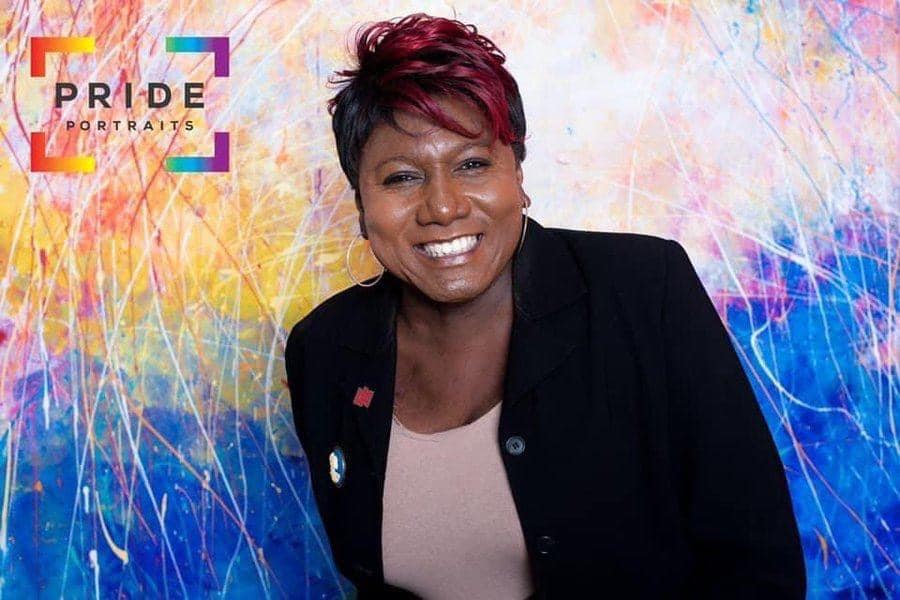
A pioneering journalist, big sister to many, and ride-or-die champion of all things Black and trans, Monica Roberts passed on October 6, 2020, in Houston, Texas. In honor of her life and work, her hometown mayor, Sylvester Turner, lit Houston City Hall in the trans flag colors – while those left behind sifted through her words to mourn a legend.
“Saying it loud,” Monica instructed us daily on her award-winning blog, TransGriot,” I’m unapologetically Black, trans and proud!”
Before the media began spotlighting the triumphs and tragedies of Black trans people, Monica was there writing about us. Since 2006, she presented a model for her colleagues working in mainstream media on how to report on Black trans life, especially when our lives ended.
“Far too often I saw Black trans victims being misgendered, using the words ‘man in women’s clothing,’ and the chosen name of the trans person in quotation marks,” Monica told AJ+. “I was fed up with it and I wanted to role model what good coverage looked like.”
Monica will be remembered for her relentless dedication to document our lives and our contributions. She provided us with a living record of our collective existence as Black trans people, writing about our lives with an unparalleled love and fullness, tirelessly chronicling our presence without apology. Her body of work has inspired and lifted an entire generation, including myself.
It was through Monica and her writings where I learned about our long and deep history as Black trans folks. She educated us about our pioneers – like Althea Garrison of Massachusetts, the first trans state legislator, and nightclub entertainer Sir Lady Java, who protested against Los Angeles’ anti-crossdressing laws that prohibited her from making a living in the 1960s.
“I felt like the history of trans folks, especially Black trans folk, wasn’t really told. A griot in West African culture are oral historians who are able to tell up to five centuries of their people’s history from memory,” she said. “One of the missions of TransGriot is to document our history – good, bad and indifferent – and it has to be preserved for future generations to know about this.”
Don’t get it twisted: Monica didn’t wield a myopic lens only looking to the past. While she offered us context by excavating our buried histories, she also celebrated those of us making a mark in Black trans excellence. She championed trailblazers and so many firsts – from pageant queens and filmmakers to political candidates, athletes, actors, activists and so many more.
Monica’s own history began on May 4, 1962, in Houston. Born to an elementary schoolteacher mother, Mable, and a local disc jockey and radio executive father, Rick, it’s no wonder she became a media professional and educator on Black trans history. Her father taught her that media matters and that one’s voice wields a mighty power to shape events.
“It’s even more potent when you walk the walk and back your words up with deeds,” Monica shared at the GLAAD Awards in 2016, where she was presented with a Special Recognition for her work. “Many times I’ve gotten up from behind my keyboard to lobby legislators back home in Texas and in my hometown, educating people at panel discussions and community forums around the country, and I engage in public speaking in order to make that positive change I advocate for via my writing happen.”
Monica was tireless in her dedication to fostering understanding and acceptance of trans people inside and outside communities of color. Rooted in her own experiences in the early 1990s, when she transitioned in a hostile environment as a desk agent for Continental Airlines, Monica was determined to fight against ignorance and intolerance. She demonstrated outside state capitol buildings, lobbied legislators in DC, and maintained a vigilant online presence. She was a co-founder of the National Trans Advocacy Coalition and served on the boards of the Trans People of Color Coalition and the Trans United Fund.
Outside of her writings and activism, Monica was a veracious reader and researcher, a lover of film (we both counted Carmen Jones and Imitation of Life as our faves) and Blue Bell Ice cream, and an avid NFL and tennis fan. She is survived by her mother Mable Roberts and her siblings Kevin, Kecia and Latoya Roberts.
For many, TransGriot was a beloved bookmark, but for Black trans folks its founder was much more: a fearless storyteller, a passionate historian, a fierce advocate, a sister and auntie, a comrade and friend. Now, Monica has reached the highest distinction as an ancestor, serving as a beacon of how to uplift your people without apology.
Monica showed us to ourselves by providing us with our history. Her legacy will live in the myriad of ways each of us go out in the world, emboldened by the knowledge of our great and long existence as Black trans folks, knowing that because of her, we can make history of our own. For this, we celebrate you, Monica. Thank you for all you gave us. Rest well, our dear Moni.
